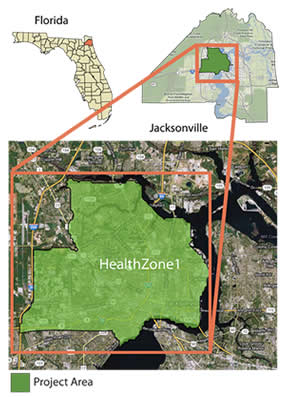Region 4 EJ Showcase Community: Jacksonville, FL Health Zone 1
Grants & Programs Topics
EJ Showcase Communities by Region
Overview
EPA Region 4 is working with the City of Jacksonville and numerous local stakeholders to improve environmental and public health outcomes in an area that consists of a predominantly low income and minority population. This area has a number of Superfund sites, Brownfields, vacant and abandoned lots or other properties where contamination is suspected and impacted waterways. Region 4 is working with its partners, including environmental justice community representatives, to address sites of concern and turn them into an opportunity for residents in the vicinity to collaborate with developers and revitalize their neighborhoods.
Successes
- Completed a comprehensive study of fish and shellfish in two local fishing streams.
- Posted 24 fish consumption advisory signs to protect public health.
- Conducted “build your own” rain barrel and community garden workshops to improve public health, provide fresh food, and address stormwater pollution for improving local water quality.
- Provided three community-industry forums to improve communications by fostering community-industry dialogue.
- Conducted a series of “shared learning” workshops to advance community integrated planning toward development of a community-based improvement plan (health care, healthy food, open green space).
- Reduced exposures of neighborhood children to asthma triggers and lead-based paint.
History

The Jacksonville EJ Showcase Community project is a multi-year partnership comprising federal, state, and local government and community partners. A key element of the Jacksonville project is the community’s goal of increasing access to health and health care. In the face of numerous public health needs, the community is particularly concerned about the lack of access to health care services and prevention opportunities. The community’s vision is to establish a health center located on a remediated brownfields that would provide essential comprehensive, culturally competent and quality primary health care services, and holistic, integrated health care. The vision integrates sustainability principles, including green building design, walkability and public transportation choices, and food security.
In support of the community’s vision, there are collaborative efforts underway with other federal agencies. The Department of Housing and Urban Development (HUD) - Department of Transportation (DOT) -EPA Partnership for Sustainable Communities has recognized the importance of this effort to link environmental justice, public health and sustainability. HUD selected the Jacksonville project as a Partnership for Sustainable Communities Signature Project to explore how housing can be used to make HUD-assisted low-income households more economically self sufficient, environmentally safe, and health vibrant. In addition, a dialogue is underway with the Department of Health and Human Services (HHS) agencies on opportunities to achieve the Community’s health and health care goals through provisions of the Affordable Care Act.
In the spring and summer of 2010, EPA Region 4 sought to partner with governmental, non-governmental and community-based organizations to identify priority public health and environmental challenges existing in Jacksonville’s Health Zone 1.
Data collection, communication, and coordination by all of the partners resulted in the creation of a Community Action Plan (CAP) which strategically targets public health and environmental improvements, and supplements the ongoing sustainability efforts in Health Zone 1.
The following are integral to the CAP and the sustainability of efforts planned for Health Zone 1:
- asthma and lead-based paint educational outreach and awareness activities;
- urban creek water quality assessments; and
- community capacity building and involvement activities.
Additionally, through the collective efforts of federal, state and local agencies and community-based organizations, the project has generated sustainable support to increase the Region’s ability to achieve public health and environmental results throughout the Health Zone 1 community.
In October, 2010, EPA Region 4 hosted a community forum to launch the CAP. Implementation of CAP activities began soon after, and is expected to continue through September 2011. The expected project outcomes are to develop long term solutions from a “bottom-up” approach and to demonstrate the importance of building collaborative relationships to engage in constructive problem-solving and reaching common goals.
Read the latest newsletter (PDF) (7 pp, 204K, about PDF)
For more information or to become involved, please contact Reginald Barrino (barrino.reginald@epa.gov), 404-562-9635
![[logo] US EPA](../gif/logo_epaseal.gif)